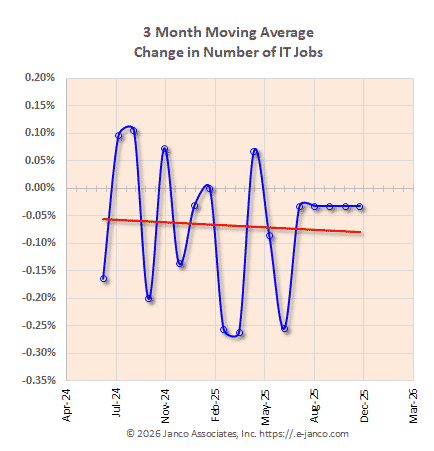Slide in CIO Compensation Stops - Demand for IT Professions Stabilizes
Park City, UT - Victor Janulaitis, CEO of Janco Associates (e-janco.com) today released the results of its January 2004 IT Salary Survey and Janco's 1996 to 2004 Comparative IT Salary Survey.
(note - Charts have been updated with the latest data. If you want to see the original charts please contact support at e-janco.com. Text is the original text. Specify which charts and dates you desire and they are available for free to paid subscribers of the CIO - IT Manager Newsletter)
There is good news; CIO mean compensation has increased for the first time since 2001. In addition salaries for other top IT positions have also stopped falling and some enterprises are planning on new hiring. Mr. Janulaitis said, “For new hires, enterprises are opting for senior experienced staff. This is resulting in increased demand for professionals with more than 5 years experience. The recovery is first being felt in mid-sized enterprises, those with revenues of $500M or less."
Study findings are:
- The mean total compensation (which includes bonuses) for Chief Information Officers (CIO's) in large enterprises increased by 1.32% from $165,329 to $167,508 and in mid-sized enterprises by 2.66% from $171,795 to $176,357.
- The mean total compensation for all positions surveyed in mid-sized enterprises has moved up to $76.003 in start of 2004 from $75,759 in the last quarter of 2002. At the same time in large enterprises the median compensation is at $79,338.
- Some of the organizations that had eliminated training, planning and infrastructure positions, such as change control, are beginning the process of limited re-staffing in those areas.
- Voice/wireless communication and security positions have been upgraded within many enterprises. Where these positions were lower to mid level positions before 2000, in 2003 and beyond these positions are now mid level to senior level positions.
- Demand is high in the internet and network areas of e-commerce, voice/wireless communication, object programming, data security and data warehousing as enterprisers try to prepare for the next wave of the new wireless technology.
- Individuals who had planned on retiring in 2003 and 2004 and have not recovered from their retirement portfolio's shrinkage are deferring retirement. In interviews, Janco found a significant number of these individuals have focused on staying employed versus looking for increases in compensation.


